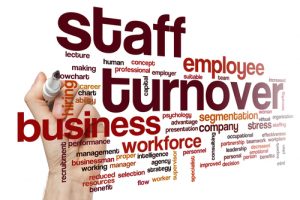As businesses fight the leftover waves of 2021’s ‘Big Quit,’ they have been forced to implement new strategies to attract/retain employees in an ever-changing and uncertain business world.
As a result, employees’ expectations of their employers have changed, and they demand more pay, recognition, benefits, opportunities, etc., in return for their loyalty.
Employee loyalty is essential for businesses since it helps them reduce employee turnover expenses, which can not only cost them money but also productivity and growth. Yet, how do you attract/retain employees in an age that prioritises digitalisation? The answer lies within the source; technology can provide businesses with solutions to reduce staff turnover and improve staff retention.
From making work more flexible and eliminating geographical barriers to automating workloads and making the workplace more environmentally friendly, technology can help businesses implement various tools/strategies to improve productivity, engagement, profitability, retention, morale, and more. In this blog post, we explore several ways technology can help businesses reduce staff turnover and improve employee retention – continue reading to find out more.
It Makes Work More Accommodating
 According to a recent study by Remote, over 76% of working professionals surveyed want flexible working hours, which would influence them when applying for or accepting new job options. Whether working from home full-time or some days in-office and others from home, modern-day employees need their employers to accommodate their lifestyles, which flexible working hours can help them achieve.
According to a recent study by Remote, over 76% of working professionals surveyed want flexible working hours, which would influence them when applying for or accepting new job options. Whether working from home full-time or some days in-office and others from home, modern-day employees need their employers to accommodate their lifestyles, which flexible working hours can help them achieve.
No matter the demographic, all employees lead different lives. Some might need to leave the office at three o’clock daily to collect their children from daycare. In contrast, others might have pets that can’t be left home alone for too long, so non-remote/hybrid working options have become a deal-breaker for many prospective employees.
This has become much easier for companies to enforce using telecommuting technology like cloud computing which can create a framework for your organisation’s virtual work environment. Adding other business apps/software like video conferencing, instant messaging platforms, and project management software can make you feel like you never left the office and keep employees happy!
It Helps Employers Supports Professional Development
Nowadays, modern-day employees want more from their employers than above-average pay; they also want work benefits, validation, and learning/development opportunities to help their professional development.
And with one in every pair of employees pursuing learning opportunities outside of work, the latter has become of utmost importance for employees so that they reduce staff turnover and improve employee retention.
Thanks to the development of eLearning, this is also something that technology can help your business with. Using learning management systems (LMS), employees can choose the training modules they’d like to complete, enabling them to control their professional development, a value that employees hold close to their hearts.
The best LMS can be accessed anywhere and anytime, like the one from Kallidus, meaning employees can learn at their own pace without being held to workloads, deadlines, or the learning abilities of other employees, making the experience much more enjoyable.
To learn more about this eLearning platform (and their other products!), consider visiting their website, following their blog, or requesting a demo to see how it could help your business reduce employee turnover and improve employee retention today.
It Can Make Your Business More Sustainable
In today’s business world, business leaders are forced to remain competitive by keeping an eye on business trends which can help introduce new policies/processes/strategies for improved performance. However, some trends like sustainability have become so popular that they can no longer be ignored.
Nowadays, when consumers are making a purchasing decision, around 72% of them think about the item’s environmental impact during its planning, manufacturing, processing, and shipping stages. However, not only do customers think about a business’s environmental impact and the impact of its products/services – employees do too.
According to studies, more than half of the respondents said they would be more likely to work for a company with sustainability incentives. Due to this way of thinking, retailers have been forced to consider these preferences when attracting/retaining employees to keep turnover to a minimum. Fortunately, there are various ways that technology can help.
From cutting out unrequired processes, reducing energy, and improving infrastructures, there are various pieces of tech to help businesses promote sustainability by making their operations more efficient. This can help the company retain its top talent and reduce turnover since it satisfies employees (and consumers!).
It Can Automate The Parts Of Work Nobody Wants To Do
No matter your business’s industry, there will always be tasks that nobody wants to do. Whether it involves going through employees’ holiday requests or spotting workplace hazards like gas leaks, manual or repetitive work tasks can be offloaded thanks to automated technology, which can improve employee retention/attraction.
While some employees are worried about robots replacing them, other employees are thankful that they eliminate these monotonous jobs so that they can invest time into other areas of the business that need more attention.
Most popular is the use of ‘cobots’, which work alongside humans in production lines and take on the more ‘dangerous’ tasks of the job, leading to improved safety protocols, fewer injuries, and happier employees that are more likely to remain with an employer that looks out for their health and well-being.
How to get the best deals everyday!





